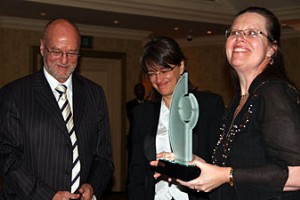Posted on October 10, 2011
Prof Minnaar, from the Department of Food Science, won the first prize in the category: Capacity Development, as a result of the EU Marama II project she was involved in. The project focused on the marama bean, an underutilised legume crop native to the Kalahari Desert and neighbouring sandy regions of Botswana and Namibia and the Gauteng region of South Africa. It forms part of the diet of the indigenous population in these regions. The overall objective of Marama II was to improve food safety and diversify livelihoods for poor people in Southern Africa through the development of healthy marama bean products.
Prof Amanda Minnaar collaborated with her counterparts from the University of Botswana, the University of Namibia, the University of Copenhagen (Denmark), the Instituto de Investigação Científica Tropical (Portugal) and the University of Maribor (Slovenia).
Prof Dave Berger, from the Department of Plant Science and the Forestry and Agricultural Biotechnology Institute (FABI), won second price in the category: Capacity Development. He won the award for his contribution as scientific co-ordinator of the EU INCO-DEV project SAFEMAIZE, which was focused on food security. Farmers in Africa face the challenge of their maize crop being infected with a cob rot fungus that produces mycotoxins, which has serious health implications for the consumer. The project aimed to develop strategies to reduce this risk. The project built capacity in crop biotechnology and enhanced co-operation between the three South African partners — the University of Pretoria, the Agricultural Research Council and the CSIR —through collaboration with University of Rome and the Istituto Sperimentale per la Cerealicoltura in Italy. Importantly, plant pathology capacity in Zambia was enhanced through collaboration between the University of Zambia and Plant Research International in the Netherlands.
“The award is recognition of the hard work carried out by all the SAFEMAIZE team members, and we are encouraged by the support from the Department of Science and Technology through its ESASTAP programme”, said Prof Berger.
The European South Africa Science and Technology Advancement Programme (ESASTAP), implemented by the Department of Science and Technology (DST) and funded by the European Commission (EC) under the Sixth Framework Programme (FP6), significantly enhance the support and assistance available to both South African and European researchers to optimally leverage mutual benefits from this partnership.
Through enhanced networking and partnering, scientists and institutions from the European Union and South Africa jointly explore new and emerging scientific and technological areas, anticipate future science and technology needs, and cooperatively seek to resolve major global issues.
The main aims of ESASTAP are to


Copyright © University of Pretoria 2025. All rights reserved.
Get Social With Us
Download the UP Mobile App